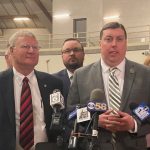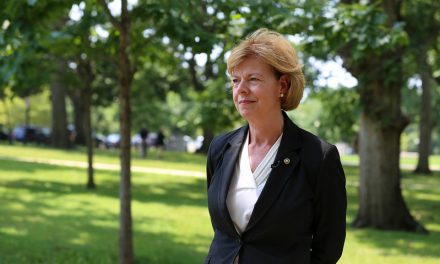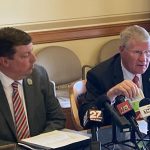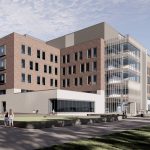
The Ride funds $352,000 in cancer research at Carbone Cancer Center
Grants awarded during Saturday’s Badger hockey game
MADISON, Wis. – Research efforts at the University of Wisconsin Carbone Cancer Center received a $352,000 boost this weekend when The Ride announced the winners of 14 scholarships during the Badger hockey game Saturday night. In two years, The Ride has raised more than a half million dollars for cancer research at UW-Madison.
The second year of The Ride took place in September and drew more than 1,250 bike riders to the roads of eastern Dane County to raise money for local cancer research.
“The Ride was created as a way for the community to support that most promising cancer research at the University of Wisconsin, and to move the most promising laboratory discoveries into treatments and cures,’’ says Dr. Deric Wheeler, director of The Ride and associate professor of human oncology at the UW School of Medicine and Public Health.
Wheeler notes that 100 percent of all money raised by riders goes directly back to fund cancer research at UW.
Wheeler and team are excited with the second-year success of The Ride, noting that the event saw an increase of 400 riders and more than doubled the fundraising amount from its inaugural year. This year’s event will take place on Sunday, September 23. For more on the research projects and details on the 2018 event, please see The Ride.
The research awards made during the intermission of the Wisconsin Badgers versus Penn State Nittany Lions hockey game went to:
- Dr. Edward Jackson, professor and chairman of medical physics, and a team of UW experts that includes Drs. Matt Witek, Greg Avey and Tabby Kennedy who are working together with a new device (PET/MRI scanner) to more precisely image head and neck cancers to improve future treatment approaches for these complex patients
- Dr. Paul Ahlquist, professor at the McArdle Laboratory for Cancer Research, who is studying how viruses cause certain cancers (such as cervical and head and neck cancer) and developing new approaches to improve future treatments for these cancers
- Dr. Bethany Anderson, assistant professor of human oncology, studying ways to further customize delivery of radiation for women with breast cancer
- Dr. Steven Howard, associate professor of human oncology and a brain-tumor expert, studying the customized delivery of radiation and drug therapy for patients with brain tumors
- Dr. Shigeki Miyamoto, professor at the McArdle Laboratory, who is studying how cancers develop therapy resistance and developing strategies to reverse resistance
- Dr. Joshua Lang, assistant professor of medicine, who studies circulating tumor cells to detect cancer at an early stage and develop new treatment approaches for resistant cancers
- Dr. Peter Lewis, assistant professor of biomolecular chemistry at the Wisconsin Institutes for Discovery, who studies how molecules that “coat” the DNA in our cells can regulate cellular function and influence how cancer cells grow and respond to treatment
- Dr. Jennifer Smilowitz, associate professor of human oncology and medical physics, who performs cutting-edge research on next-generation radiation treatment machines to further improve treatment outcomes for cancer patients
- Dr. Beth Weaver, associate professor of cell and regenerative biology, who is studying how tumor cells grow and discovering new biomarkers to better predict which tumors will respond best to specific cancer therapies
- Tao Wei, graduate student working in the laboratory of Dr. Paul Lambert, studying viral associated head and neck cancer.
- Ian Marsh, graduate student working in the laboratory of Dr. Bryan Bednarz, studying how external beam radiation can be combined with molecular targeted radioactive isotopes to advance cancer treatment.
- Mark Klein, graduate student working in the laboratory of Dr. Jon Denu, studying how to activate and alter the activity of specific enzymes in cancer cells to improve cancer treatment
- Yousef Alharbi, graduate student working in the laboratory of Dr. Manish Patankar, studying novel chemotherapy drugs for women with advanced ovarian cancer
- Bella Nava Family, 15-year old cancer survivor, directing her award to the pediatric cancer research laboratory of Dr. Mario Otto, a UW researcher and physican who studies new treatment approaches for pediatric cancers.





